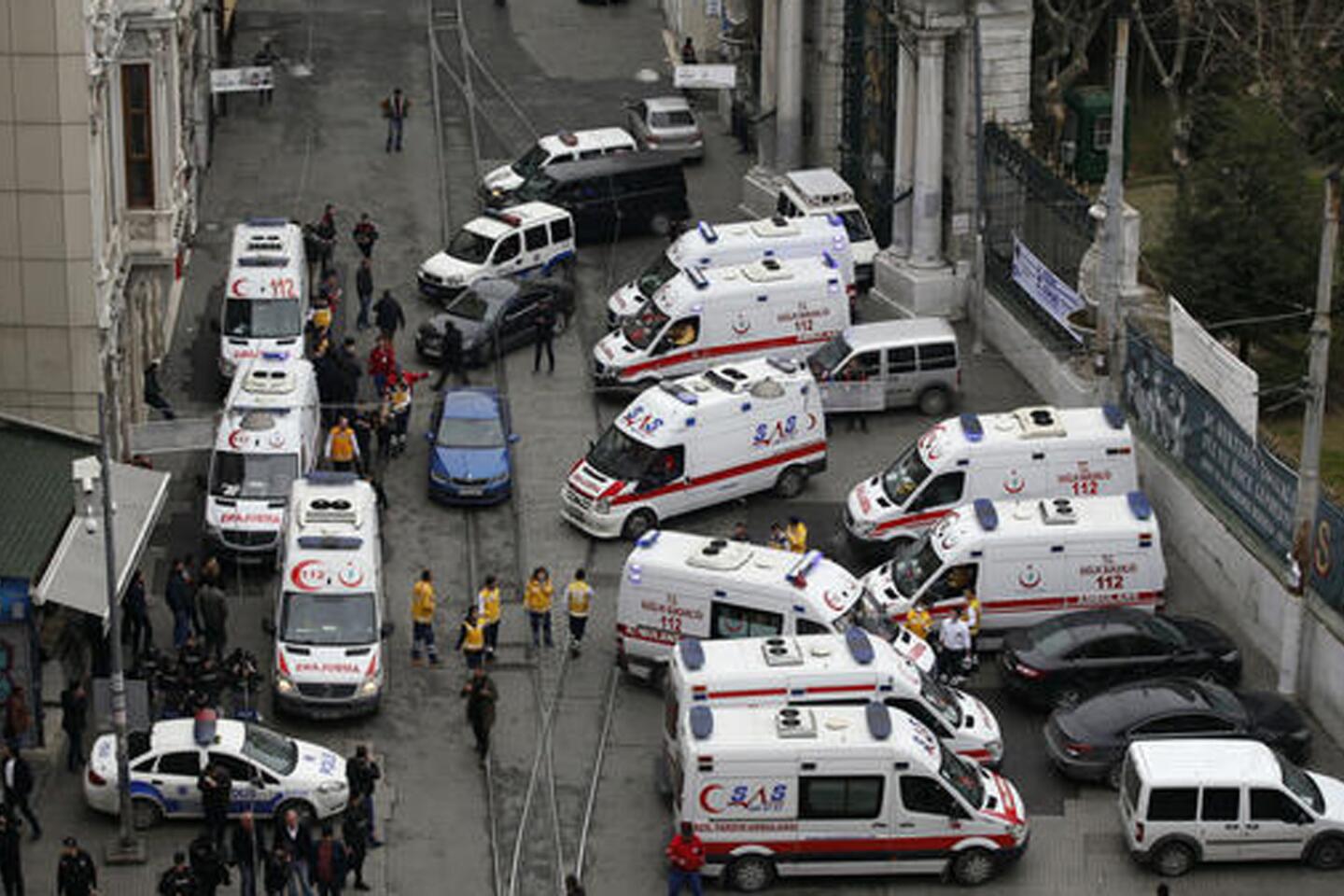Another suicide bombing in Turkey kills 4 and injures dozens, spreading fear of more attacks
Reporting from ISTANBUL, TURKEY — A suicide bomber struck the heart of Istanbul’s tourist district on Saturday, killing at least four people and injuring 39, including many foreign nationals, authorities said.
The target, a bustling central avenue frequented by foreign visitors, suggested that the bombing was the latest attempt to undermine Turkey’s crucial tourist industry.
Late Saturday, Turkey’s official Anadolu news agency reported that the dead included a pair of dual U.S.-Israeli nationals. Twenty-four of the injured were foreigners, the state news outlet said, quoting Istanbul Gov. Vasip Sahin.
It was the latest in a string of attacks that have rocked Turkey and raised questions about internal security here.
The attacker Saturday ran down busy Istiklal Street, a main pedestrian thoroughfare, before he detonated a suicide vest, according to closed-circuit video obtained by local media.
The attack came as Turks were already on edge from a bombing last Sunday in the capital, Ankara, that killed 37 people in a crowded public square and spread fear that more attacks were imminent.
Security forces had been deployed across Istanbul to protect foreign consulates and areas known to draw large crowds. Some reports said that Saturday’s bomber was intending to target a larger crowd near the entrance to busy Taksim Square, but that a heavy police presence there apparently dissuaded him.
Within minutes of the blast, hundreds of police along with plainclothes officers strung yellow tape along Istiklal Street, which sees more than half a million pedestrians each day.
“Close it up, go home, no one is going to come today,” the owner of a seafood restaurant on Balik Passage, blocks from the bombing site, told fellow businesses owners.
Many shopkeepers and restaurants in the area did just that. At the few businesses that remained open, waiters sat at empty tables watching live news coverage about the bombing.
“What can we do about this?” asked Kemal, a waiter at a restaurant off Istiklal Street who didn’t want his last name used. “Anyone can just walk by and throw a bomb at you.”
He speculated that the bombing was the work of the Islamic State group, which controls stretches of territory in neighboring Syria and Iraq.
As of late Saturday, no one had publicly taken responsibility for the attack, and authorities had not named the bomber or any affiliation he may have had. Several armed factions currently operate in the country.
Recent bombings have been linked both to Islamic State and one of its enemies, the secular Kurdistan Workers’ Party, which has waged war against the Turkish state for more than three decades.
An offshoot of the latter group claimed responsibility for Sunday’s attack and in a statement said it had “hundreds of members ready to conduct suicide attacks” in crowded places across the country.
In the nation’s predominantly Kurdish southeast, an informal cease-fire between government forces and Kurdish guerrillas fell apart last year, and fighting has picked up in recent months.
More than 350,000 civilians have been displaced, but the conflict gets relatively little coverage by media outlets in Istanbul and Ankara. Authorities periodically impose news blackouts and crack down on the independent press.
Saturday’s attack was not the first in Istanbul that seemed aimed at the tourism industry, a major source of revenue. In January, a suicide bomber allegedly linked to Islamic State killed 10 people, most of them Germans, in the Sultanhamet district, another major tourist hub.
Among those injured on Saturday, authorities said, were six Israelis, two Irish nationals and citizens from Germany, Iceland, Iran and the United Arab Emirates.
For weeks, foreign embassies in Turkey have been warning of possible attacks. In the days before Sunday’s attack, the U.S. Embassy had told Americans to avoid part of Ankara. The German Foreign Ministry said it had specific information of a possible attack and closed its embassy in Ankara and consulate in Istanbul — along with several German schools — on Thursday, Friday and Saturday.
Saturday’s bombing occurred just a few minutes’ walk from the German Consulate in Istanbul.
Celebrations of Nowruz, the Persian New Year, marked by Kurds were scheduled for Sunday and Monday, but authorities have said such gatherings would not be allowed, citing the threat of attacks by Islamic State, which has killed scores of civilians in bombings targeting Kurdish events over the last year.
Government officials and experts have pointed to the difficulties of stopping suicide attacks in a free, largely open society like Turkey.
“In all fairness, it’s practically very difficult in city like Istanbul, of 15 million people, to stop every person and check them for suicide vests or IEDs,” said Gareth Jenkins, an Istanbul-based counter-terrorism expert with the Silk Road Institute, using an acronym for improvised explosive devices. “But obviously there is a shortage of good intelligence among Turkish authorities.”
Over the last six months, scores of suspected militants, the vast majority thought to have ties to Kurdish groups, have been detained in raids across Turkey. Saturday’s bombing seemed certain to spark fresh roundups of terrorism suspects.
“After every attack we see mass arrests, and maybe some of those arrested are guilty,” Jenkins said. “But we have to ask why the arrests are happening after, and not before, the attacks.”
Farooq is a special correspondent. Times staff writer Patrick J. McDonnell in Beirut contributed to this report.
ALSO
Lufthansa jet and drone nearly collide near LAX
Jury awards Hulk Hogan $115 million in sex, celebrity and privacy case
All 62 aboard Dubai airliner killed in crash in southern Russia
More to Read
Sign up for Essential California
The most important California stories and recommendations in your inbox every morning.
You may occasionally receive promotional content from the Los Angeles Times.












